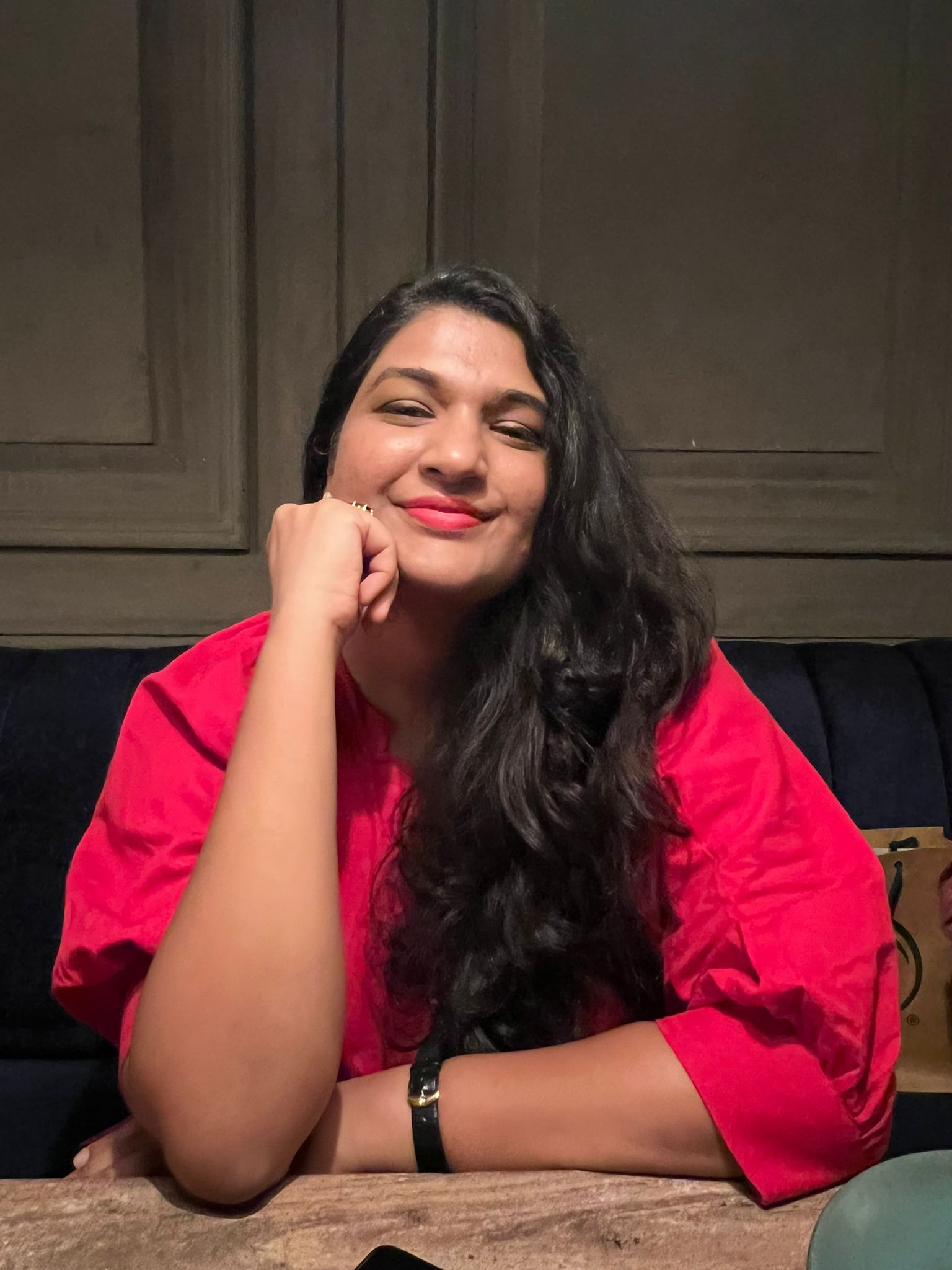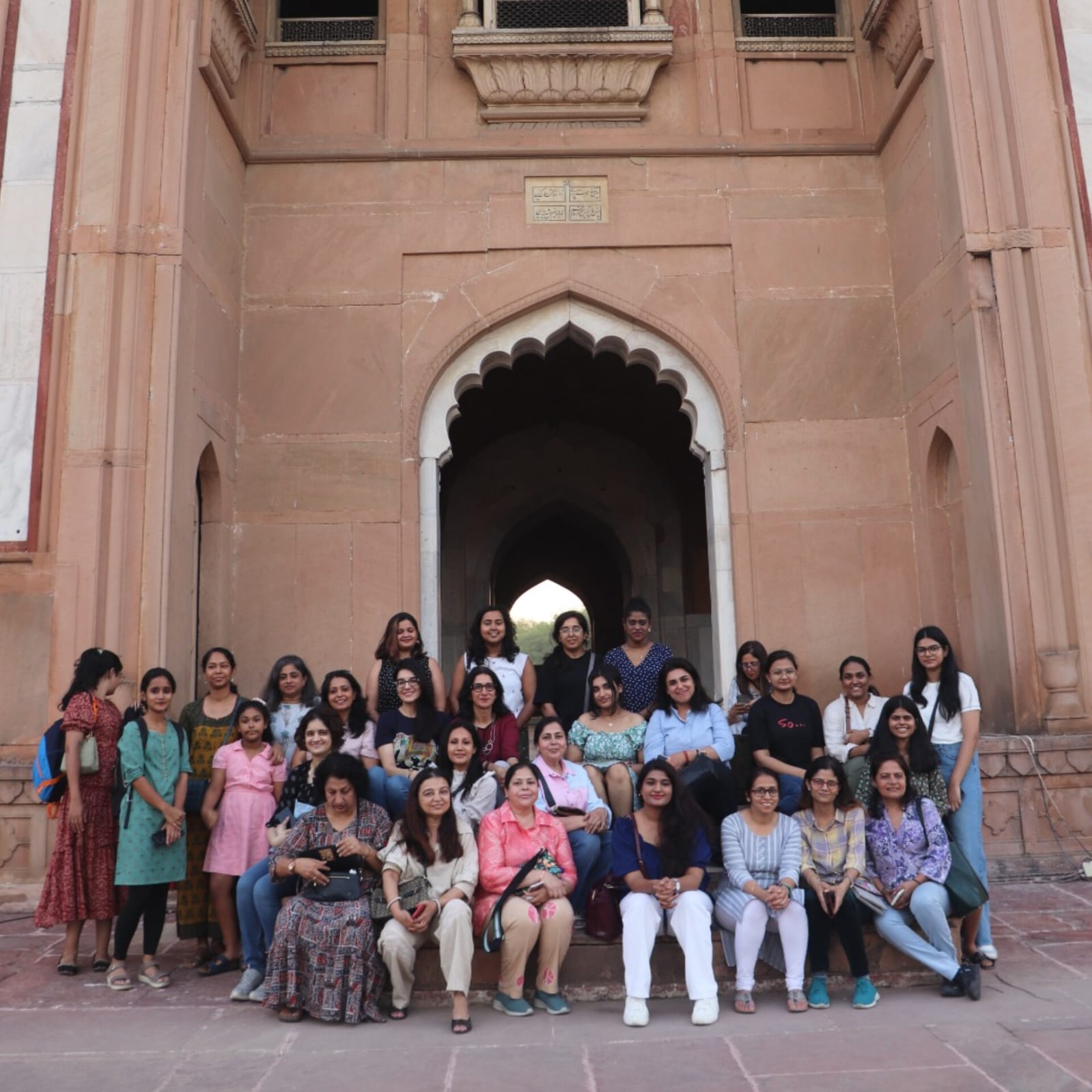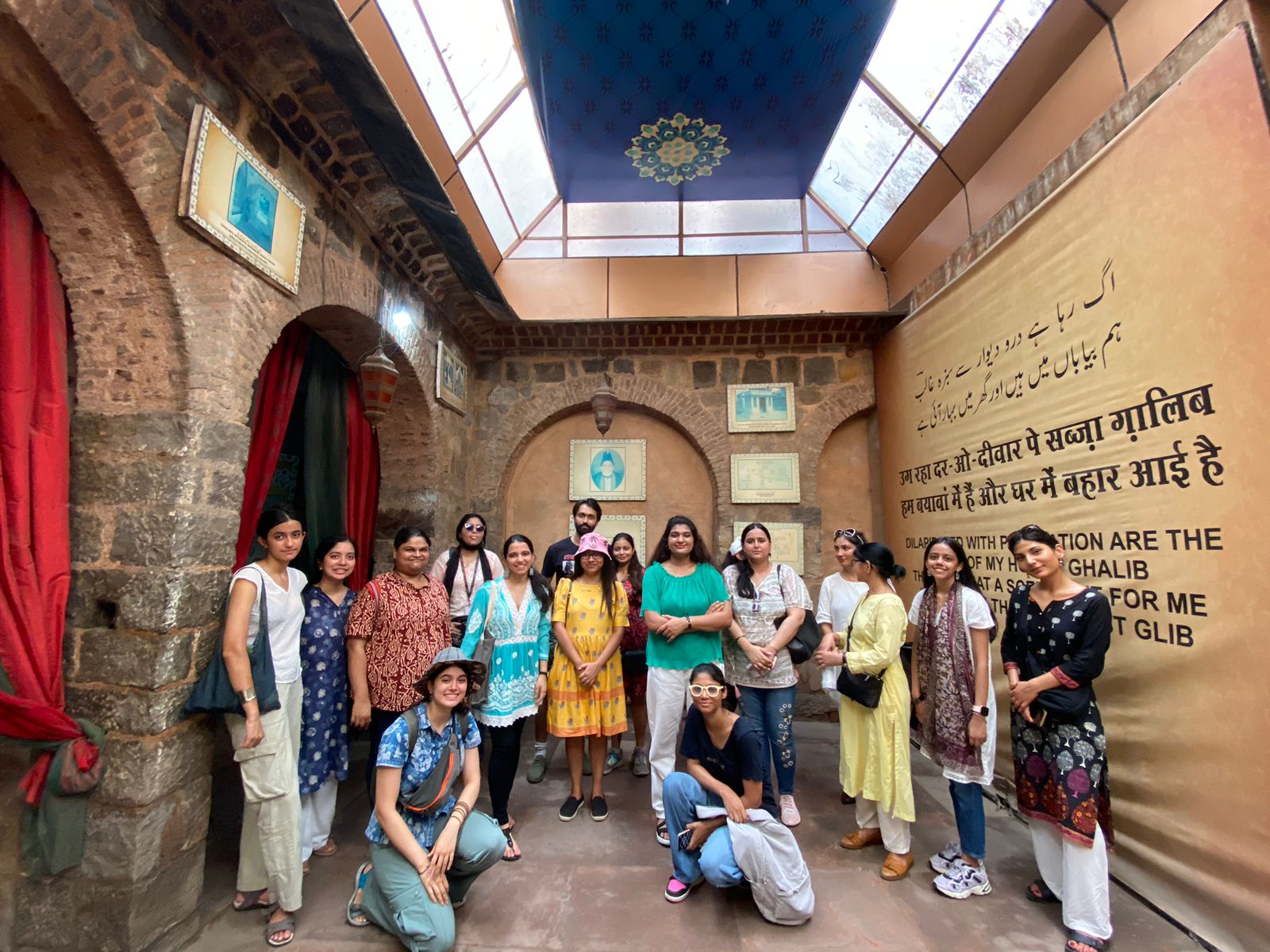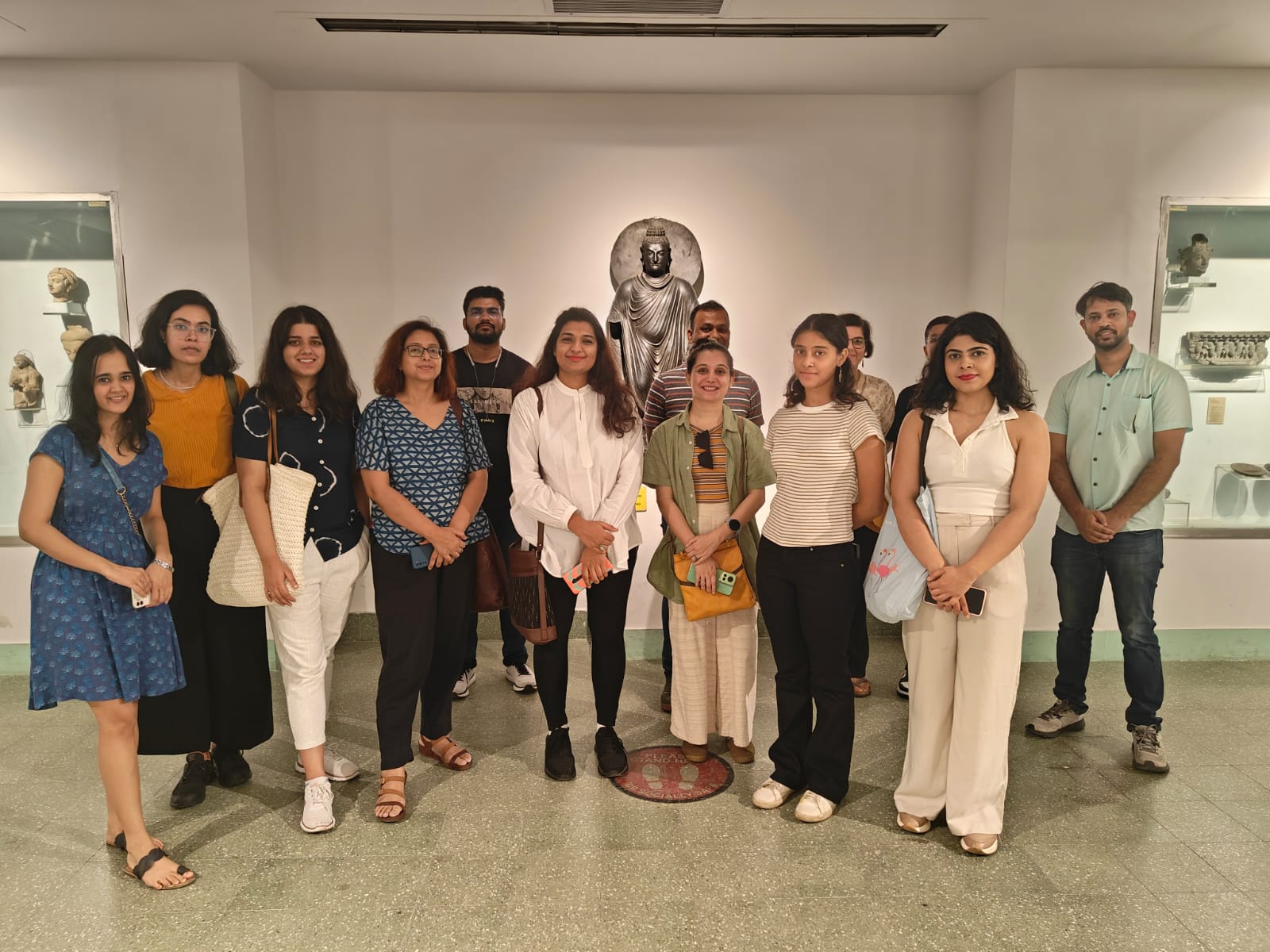Anoushka Jain is an entrepreneur who founded a unique heritage organisation, Enroute Indian History. She has been heading the organisation for over four years. She is passionate about history, and heritage, and aims to bring people closer to their cities through well-curated, research-based heritage walks and education. She is also a member of Ladies Who Lead, which is an organisation dedicated to enabling women leaders to network and advance in their careers.
FII: Can you tell us a little bit about yourself so that we can understand your motivation to start Enroute Indian History?
Anoushka Jain: I did my bachelor’s and master’s in history from Hindu College, Delhi University. I also did a diploma in Art history. I later interned at Indira Gandhi National Center for the Arts (IGNCA), where I was working in the Janapada Sampada division with UNESCO, but I found the work very clerical. Heritage was something that genuinely interested me, but one needs to understand that the entire cityscape and the landscape of heritage was very different even five years ago. The kind of boom that we have seen is drastic. I was preparing for my MPhil and to be honest, I never wanted to do academics further on. I loved research, but I did not think that my area of interest can be contained towards just one topic so a lot of people kept suggesting to me, ‘Why don’t you start heritage walks?” To me, this was a far-fetched idea. It’s not easy to organise heritage walks because, at that time, there was a very small demographic which was attending these walks. I wasn’t thinking along the line of ‘Will this be lucrative?‘. The problem was at a very fundamental level: the problem was about opportunities and exposure. Will people even attend my walks? I never had it in my mind that this would turn out to be an organisation at such a big level.

Regardless of the size of the organisation, I knew that I wanted to start this in different cities, which is how the name Enroute Indian History came up. The company was established in 2019. As time went by, someone said, ‘I would love to intern with you.’ I was like, ‘But why would you want to intern with me? It doesn’t make sense. What will I teach you?‘ (laughs) Slowly more people joined. Sadly enough, in 2020, the pandemic hit. But that was the time when the organisation finally found its very strong foundations, where I realised that this can be something really big.
FII: It has been almost over four years since Enroute Indian History was founded. How has it grown in the past four years and what are your future plans for the company and for yourself? Do you plan on expanding your network to other major cities instead of keeping it limited to Delhi? I would love to see something like this in my city, Ahmedabad.
Anoushka Jain: That is the request quite a few people have made. I have heard many people say that the heritage in Ahmedabad is so political and it would be interesting to have a very nonpolitical view of history. In the past two years, slowly and steadily, we started bringing in new segments. The first segment that we started was the digital walks during the pandemic. Initially, I thought that I would not be able to justify it; I would not be able to translate the experience of a physical walk into a digital walk.
The first segment that we started was the digital walks during the pandemic. Initially, I thought that I would not be able to justify it; I would not be able to translate the experience of a physical walk into a digital walk.
Anoushka Jain
But I tried it, and it got such a great response. It was also a wonderful way to connect pan-India. When we started doing digital walks of every monument in Delhi, we started getting registrations from the UK, the USA, Pakistan, etc. Some people said they no longer have parents or family in India, so they never come back so this was a great way to experience the city. Some people during the pandemic years felt homesick and just by attending digital walks, they felt at home. People from Pakistan said they found it hard to get a visa, so they were so happy to see the monuments of those areas. We then also started Ladies Night Walk where we conduct walks for women. The Delhi government inaugurated a lot of monuments in 2019. A lot of women expressed that they feel very unsafe while going to monuments. They would be concerned about their safety, ‘Is there a parking lot nearby? Is there proper security?‘ That is when I decided that since this is the only women-led heritage organisation in Delhi, it will be wonderful if we do Ladies Night Walks. We sell one-plus-one tickets, and the reason we do that is so more women can come and engage because women alone may not want to come in the evening. They prefer coming with someone: mother, aunt, niece, professor. We get such an amazing spectrum of people joining our walks. I have observed that a lot of people from LGBTQ+ community feel safer in a Ladies Night Walk. We find a lot of partners together where they don’t feel judged.

We have also been working in the education sector. We work with schools because you cannot introduce heritage at an advanced level. You can’t teach people the importance of heritage when they’re 30 or 40 years old. You need to introduce heritage in the formative years with a proper curriculum; one isolated heritage walk in a year won’t do. For this purpose, we introduced RSR learning: Real-Time Learning, Skill Development, and Research. We have been working with museums to create these amazing heritage walks because I don’t think that reading a two-line description of the Dancing Girl is enough. You need to really bring it to life. I have mentored around more than 150 women and I was amazed to discover that Enroute is one of the leading websites when it comes to history and heritage internships.
In terms of the day-to-day functioning of the organisation, we have research and writing where young students who have done graduation or master’s research articles. Every week, we meet. brainstorm and discuss how to write articles. We have the art explorers, the media and production team, and photographers and videographers.
We receive a lot of applications from men who are videographers and photographers. But women, too, love exploring these areas. It’s just that they need permission, they need a ticket for freedom. Freedom is not already there for women; it needs to be taken. We always made sure that we are hiring women reel-makers, videographers and graphic designers. There are stereotypes that women are not good with computers. I have these wonderful people who are amazing graphic designers and video editors, and they are making their own documentaries. We have heritage mappers where women go out in the field and map out the areas for potential walks. This doesn’t mean we don’t hire men but the stats are always in favor of women. When we hire men, we make sure they understand this is like a Barbieland.
This helps us understand how it feels when women are in power, women are in a larger number. They can just be whoever they want to be. As long as these kinds of men are aligned with our thought, I don’t mind having them. I did have a moral, ethical dilemma because we get these applications from good guys who apply and I wondered, ‘Am I being discriminatory by choosing a girl over a guy?‘ But then I realised that the opportunities where women are hired are far less in a larger canvas of the world where men are given preferences.
I love it when women talk, when women are given that space and confidence and realise that 30-40 people are ready to hear you: I am being observed not because I am pretty or anything, but just because I am saying words that are important and relevant. I am educating people and a community. This is not a classroom setting. This is a community where people are willingly coming to hear me.
I am being observed not because I am pretty or anything, but just because I am saying words that are important and relevant. I am educating people and a community. This is not a classroom setting. This is a community where people are willingly coming to hear me.
Anoushka Jain
As for the future of Enroute, we definitely want to expand to other cities. Last year we started giving walks in Mumbai with Times Now. We intend on starting walks again in Mumbai and other cities like Kolkata and Bangalore. The model will be three-pronged where we will focus on education, the corporate sector and also at the community level (in the form of heritage walks). If we only do heritage walks in any city, it will be just a drop in the ocean. I think this needs to come at all three levels for it to expand.
FII: This approach was innovative and scary at the same time since it hadn’t been done before. So, I would like you to comment on the difficulty of bringing in a research angle and combining research with a very intellectually accessible format of tourism.
Anoushka Jain: Academic tourism is very new. I am an academic, not a storyteller. I have to really carefully balance this act where sometimes I cannot be too academic, because people may not like it if there’s no mirch masala, no storytelling. I cannot be a storyteller completely because then I will end up being inauthentic to myself. Moreover, to tell people that, ‘Listen, you need to pay this much money. You need to stand and perhaps take the heat, rain, uncomfortable noise and environment because I guarantee you that at the end of the 1.5 hours, you will see the city in a completely different light.’ – this is something that requires a lot of persuasion. It is not easy to convince 40 people to come on a heritage walk instead of going to a mall or a cinema hall. That is where the marketing comes in.

A lot of people told me to only focus on heritage walks and not on the research aspect of it. However, a lot more people are interested in history today because it’s more accessible to them. I aim to bridge the gap between academic history and popular history, which is why I think research and writing becomes crucial to the work I do.
FII: What are the challenges that you experienced as the first women-led heritage organisation in Delhi?
Anoushka Jain: When I started, nobody took me seriously. They just assumed that I was probably doing this as a side hustle or as a hobby. When I used to talk to web designers, they would often ask me, “Don’t you have a superior person?” They were looking for some male superior.
Whenever I do these videos on Instagram, I am sometimes afraid to check the comments because women are generally more sexualised than men. In the beginning, I used to get these men who I used to think were genuine readers who wanted to connect with my content. Then I realise they treat this as a dating platform or they’re trying to flirt. I used to have these issues even with big platforms. When I used to send them e-mails, they would never process my business request, rather, they used to send a personal request on my page and chat with me.
Even now when I go for heritage mapping in certain areas that are very secluded, I have to hire people to come along with me like bodyguards. I can’t go alone because there is no security there. The government doesn’t seem to think it important to have guards stationed at these places which have a great heritage value and currency.
While conducting my walks, men can easily flirt in a group and get away with it. But I need to always be very professional because the moment I become very friendly or talkative, I become mistaken as someone who was “hitting on ” them. The way women present themselves in a professional setting is very important because, for other people, it is a very thin boundary between being “slutty” and being professional.
Sometimes, when I make my boundaries very clear, we occasionally get e-mails, ‘Oh, she was rude.’ Or, ‘She doesn’t smile enough. She could have laughed more.‘ I am not even sure if I want to make my Instagram profile public because I would care about what’s happening on my profile. No matter how strong you are, digital bullying really gets to you. There are threats from men who say, ‘You are digging your own grave.’, ‘You are playing the women’s card‘. Or even more extreme than that, ‘I know where you live. I know where your office is.’ There is also a fine line between being a bitch boss and being an emotional person. Sometimes, you want to be very diplomatic, but you are also afraid of being insensitive. What if I am very rude? What if I am not being considerate to people?
I always joke about this, that in a women’s organisation, every day someone is crying. (chuckles) I cry sometimes, the employees cry sometimes – I am so used to people just having a very emotionally charged workspace and I love the fact that it makes Enroute a place where women can work together. They are not vindictive; they are not fooling each other. People feel so safe here. When we are in a meeting, everyone is heard.
FII: That was a great insight into your organisation. What is your message for young women today intending to start their own businesses?
Anoushka Jain: Business will have more lows than highs. You need to be very passionate about something that you start. Do you really love it? Because in the end, it will be a sinking Titanic and only you are going to be there: people will join, people will leave. So even on bad days, you should get that satisfaction that at least you are doing something that you enjoy despite criticism, despite everything else.
You will have people who will criticise you. But then you will have people who will support you and understand you no matter what. Once you hire them in your business and your wavelength matches and they are nice and kind, don’t let them go; work with them. Have honest conversations with them. More than monetary investment, it is the human and emotional investment that you need to prioritise.

For women who are starting a business, don’t pay heed to what others are doing, because if you get wrapped up in that, you will get lost somewhere. You need to go with your gut, your sixth sense. As long as I can justify it to myself, that is good enough. Create three months and six months goals and work towards them. You need to create tangible goals for yourself.
For women who are starting a business, don’t pay heed to what others are doing, because if you get wrapped up in that, you will get lost somewhere. You need to go with your gut, your sixth sense
Anoushka Jain
We need to remember that, in the end, we live in a kind of a society where you need mental and physical support; people need each other. Don’t think you don’t need any guys’ help. Sometimes, there are nice men who will support you, so have them.
Lastly, in any sector that you join, make sure that you know everything along every step of the way. For me, I did all kinds of odd jobs in my company. I worked with the graphic department, media and production. I am now in a position where I can give people direction. I can tell where they are going wrong. Be very thorough with your work.
About the author(s)
Shakti (she/her) is an English major and an aspiring tea sommelier. She loves reading poetry and drama and can be found with a Kindle most time. She intends to become a teacher of humanities and is passionate about literature, films, politics, and history. In her free time, she has been caught watching cringe content, however, she fervently denies these claims.






Qutub minar ,humayun tomb and all islamic sh why not you declare it enroute islamic history lol